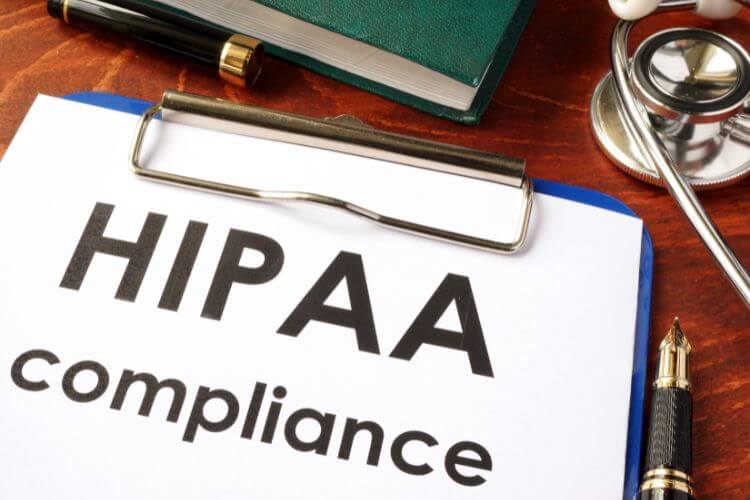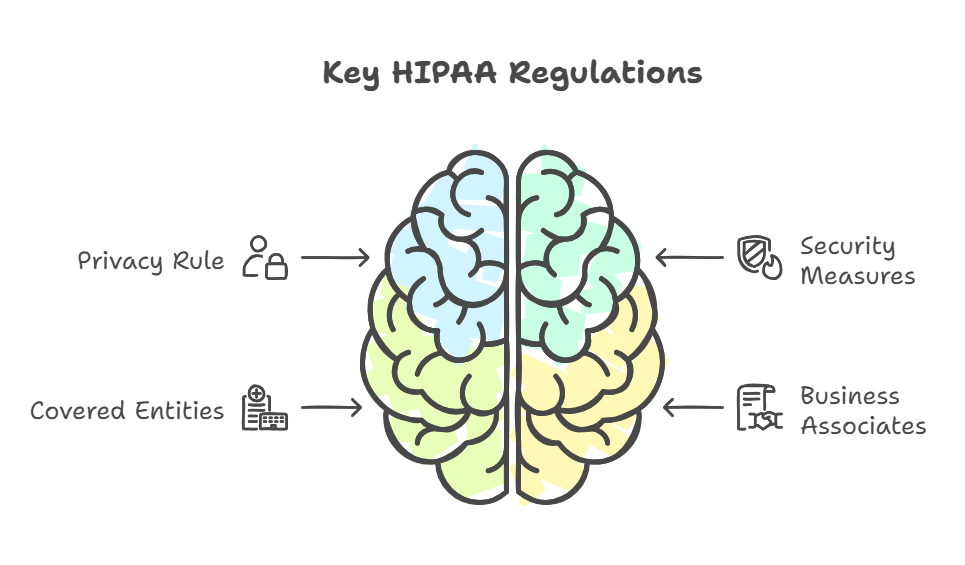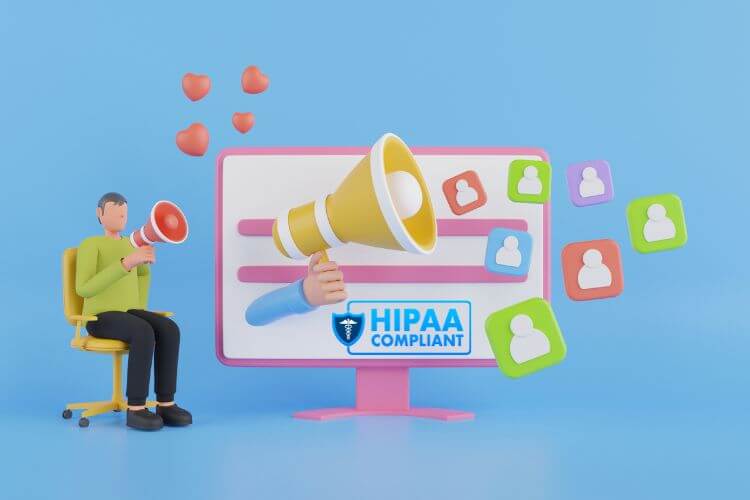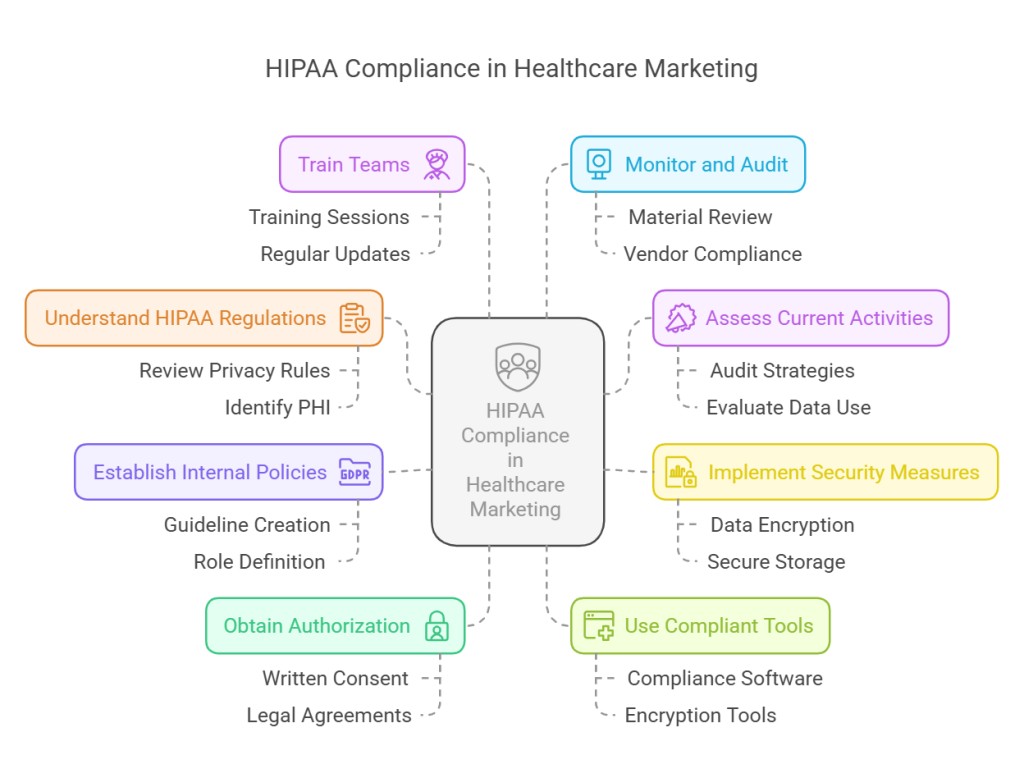Introduction
It may seem intimidating to navigate HIPAA, particularly in a competitive market where online marketing needs to be well-planned and accurately executed. Nevertheless, healthcare organizations need to be cautious about privacy to safeguard patient information and steer clear of possible legal traps. In this guide, we will explore a step-by-step strategy to achieve HIPAA compliance in digital marketing. We will also delve into the definition of marketing under HIPAA and share best practices so that healthcare businesses can confidently engage in compliant use of patient information for marketing activities.
Why does this matter? Because privacy rule stipulations and health insurance portability and accountability policies mandate strict privacy for protected health information. Whenever marketing efforts involve data for marketing or promotion, it is crucial to comply with HIPAA regulations. This article will cover how healthcare providers, tech vendors, and covered entities can craft a robust plan to protect patient privacy and digital marketing processes without sacrificing effective marketing outcomes.
Understanding HIPAA and Its Definition of Marketing

The HIPAA Definition of Marketing
HIPAA stands for Health Insurance Portability and Accountability Act, a set of federal regulations that govern how healthcare information is handled. The HIPAA privacy rule allows covered entities and business associates to maintain strict privacy standards related to patient data. When it comes to marketing in healthcare, the HIPAA definition of marketing includes various promotional or communication efforts that involve protected health information.
It is important to review the definition of marketing from official sources to determine if certain marketing practices require prior written authorization.
Marketing Under HIPAA
Marketing under HIPAA can be complex. If healthcare providers or health plans use patient data for marketing purposes, they must comply with HIPAA regulations. This means understanding whether your marketing communications cross a line that would violate HIPAA regulations. HIPAA marketing hinges on transparency, appropriate disclosure, and patient consent, particularly when using identifiable information for marketing.
Organizations must obtain written authorization if advertising efforts involve sharing PHI for promotion. Sometimes, limited communications about health-related services might be exempted. Still, prior written authorization is almost always required when it comes to the direct promotion of a product or service. Pay attention to your marketing materials, too. Even subtle references to patient data can constitute a HIPAA violation if not managed correctly.
Why Healthcare Tech Companies Must Comply
Healthcare organizations must maintain compliance to build trust with patients and stakeholders. Marketing for a covered entity often involves HIPAA-compliant digital marketing techniques that help highlight new tech solutions without divulging sensitive information. By adhering to HIPAA guidelines, your marketing and HIPAA alignment will strengthen your reputation.
Protecting information for marketing goes beyond mere risk mitigation. It also fosters brand credibility and can drive engagement. In fact, many healthcare organizations rely on marketing technologies that handle PHI to personalize services. Ensuring this data remains secure is essential to achieve HIPAA compliance. Without the right controls, even a small error can lead to HIPAA violations with significant financial consequences.
Key HIPAA Regulations Every Healthcare Marketer Should Know

HIPAA Privacy Rule
The HIPAA Privacy Rule imposes strict privacy standards for protected health information. Under these rules, covered entities must work with a business associate who can be trusted to manage patient data securely. That business associate could be a marketing software provider, an agency offering marketing platforms, or any partner that assists with marketing activities.
Failure to ensure compliance can quickly constitute a HIPAA violation, leading to fines and reputational harm. In the context of digital marketing, use a marketing tool designed for healthcare marketing scenarios. This will help you comply with HIPAA regulations because the software will be considered HIPAA-compliant and less prone to security risks.
Security Measures for Protected Health Information
A secure environment for patient data is critical. Encryption, multifactor authentication, and continual monitoring are part of the recommended strategy. It is not enough to focus solely on the privacy rule; you also need to safeguard protected health information by integrating both physical and technological measures.
Marketing in healthcare often means using data for marketing personalization. For instance, targeted email marketing can be powerful, but it should only be done via an email marketing platform that meets HIPAA compliance standards. Properly managing user data goes hand in hand with robust training on HIPAA. Ensure your marketing teams are well-versed in how to handle potential disclosure risks.
Covered Entities and Business Associates
Covered entities include healthcare providers and health plans. A business associate can be a marketing agency, an email marketing platform, or a tool that processes patient data. In all cases, there should be a business associate agreement in place, especially if you are collecting, storing, or sharing patient data to create marketing campaigns.
Healthcare organizations must verify that their vendors operate under the same strict privacy guidelines. This verification ensures that any marketing automation or technologies integrated into your digital marketing efforts remain safe and compliant. Avoiding a mismatch between policy requirements and daily operations can help you avoid HIPAA violations.
Best Practices for HIPAA-Compliant Digital Marketing

Building a HIPAA-Compliant Marketing Strategy
A well-crafted strategy results in compliant campaigns that engage your audience while protecting phi. Begin by defining your marketing strategies. Describe your primary goals, then resolve how HIPAA-compliant marketing integrates into them. Don’t forget digital marketing involves a delicate balance between personalization and privacy.
One tactic is to systematically gather patient data in a way that respects privacy rule mandates. Then use marketing software solutions designed to handle phi without risking data leaks. By establishing an internal process, you can maintain compliant digital marketing at scale.
Leveraging Email Marketing Securely
Email marketing remains a crucial channel for healthcare marketing. However, it carries risks if not handled correctly. Always use an email marketing platform that is HIPAA-compliant and can prevent unauthorized disclosure of patient information. Overlooking even a single detail can lead to accidental data exposure.
Before you send any promotional messages, verify you have prior written authorization where required. This is especially important if your emails include personalized content featuring PHI. By running your campaigns responsibly, you protect patient privacy while still enjoying the benefits of targeted outreach.
Protect Patient Data in Marketing Materials
Healthcare organizations must remain hyper-vigilant about how they reference patient data in marketing materials. Even if you only use aggregated statistics, always ensure that direct identifiers are removed. This helps protect patient privacy from inadvertent leaks.
When creating marketing campaigns, consider anonymizing case studies or success stories by removing personal details. If you are sharing data for marketing analysis, double-check that all references to specific individuals are fully stripped. Incorporating these practices helps you maintain a steadfast commitment to privacy.
Step-by-Step guide

Understand HIPAA and Its Definition of Marketing
Begin by reviewing health insurance portability requirements and the HIPAA privacy rule. Clarify whether your marketing activities or marketing communications involve protected health information. Confirm the types of marketing purposes that may require written authorization from patients. This foundational knowledge will help you create a compliant marketing approach.
Assess Your Current Marketing Activities
Conduct a thorough audit of all marketing strategies and marketing practices. Determine how patient data is collected, stored, and used in digital marketing. Identify whether your current promotion or advertising efforts intersect with HIPAA rules, particularly if phi is utilized for marketing materials. This step helps you gauge where changes are needed.
Identify PHI in Your Systems
Locate all databases or processes involving phi that might be used for healthcare marketing. Check whether your marketing tool or marketing platforms access sensitive information. If phi is present, ensure you have a plan to secure that data according to strict privacy guidelines.
Implement Security Measures
Protect patient data with encryption, secure storage, and continuous monitoring. Verify that your business associate or any other partner in healthcare marketing adheres to similar data protection protocols. A well-managed security framework supports HIPAA compliance while letting you run marketing campaigns confidently.
Establish Internal Policies and Guidelines
Create a formal guideline covering how to handle PHI, privacy rule obligations, and marketing under HIPAA. Outline roles, responsibilities, and escalation pathways for potential issues. This policy document should also specify strategies for maintaining patient privacy in marketing materials and healthcare-related promotional efforts.
Obtain Written Authorization Where Necessary
If your marketing purposes require personal health information, confirm whether you need prior written authorization. Covered entities, such as healthcare providers and health plans, must obtain explicit permission from patients to use their data in certain marketing communications. Failure to do so can violate HIPAA.
Use HIPAA-Compliant Tools and Platforms
Ensure your marketing software and marketing platforms meet HIPAA regulations. If these technologies process patient data, they must be considered HIPAA compliant and support the secure management of protected health information. Look for platforms with end-to-end encryption and a track record of protecting healthcare information.
Sign a Business Associate Agreement
Before sharing data with external vendors, execute a business associate agreement. This legally binds the vendor to comply with HIPAA requirements. It is essential for preserving privacy and avoiding disclosure of sensitive patient information to unauthorized parties.
Develop HIPAA-Compliant Marketing Campaigns
Focus on general, anonymized success metrics in your marketing materials. Avoid referencing actual patient data unless you have authorization. Compliant campaigns can still highlight the best outcomes, future innovations, and robust healthcare solutions without compromising private information.
Train Your Marketing Teams
Provide training on HIPAA guidelines to everyone involved in marketing efforts. Emphasize that even small lapses in data handling or marketing activities can constitute a HIPAA violation. Regular reminders and updated training sessions ensure compliance stays top-of-mind for all staff members.
Monitor and Audit Regularly
Establish regular audits to ensure your plan continues to be HIPAA-compliant. Regularly look for any improper release of PHI, examine marketing materials, and ensure business associates are meeting their obligations.
Stay Informed of Changing Regulations
HIPAA regulations evolve alongside new technologies and industry trends. Monitor official resources for any updates in the HIPAA privacy rule. Adapting your digital marketing efforts to these changes helps you protect patient privacy and remain a trusted partner for healthcare organizations.
Conclusion
HIPAA compliance sits at the nexus of patient trust, marketing, and brand reputation as a whole. By becoming familiar with the HIPAA definition of marketing, following the privacy rule, and bringing marketing under HIPAA’s guidelines, you can keep your digital marketing practices safe and effective.
Remember that healthcare organizations must treat personal data with care. By using marketing automation platforms, remaining up to date with HIPAA regulations, and establishing business associate agreements, you can make HIPAA-compliant digital marketing a differentiator. This journey will enable you to safeguard phi, advertise responsibly, and deliver optimal results for your healthcare tech business.
When you pair patient privacy and digital marketing appropriately, you lay the groundwork for trust that will ring true for audiences throughout the healthcare continuum. Lean into the appropriate balance of strategy and secure platform to obtain HIPAA compliance and watch your marketing efforts thrive.
